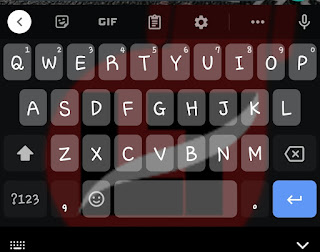To get the best out of your Android keyboard, especially for Android users then you need to have access to hidden shortcuts on your Keyboard.

Although this tutorial is strictly for Gboard users, it also applies to other keypads as most of them function alike, similarly not all keyboards offer the same functionality.
The essence of knowing these keys and symbols is to make typing on your Android phone easier, faster, and fun, with the use of characters, special symbols, and signs.
Firstly, let’s check out some of the most common tips to know before we take a look at how to access the Android special keyboard character and symbols list.
Most of the useful shortcuts are hiding under the period key as it houses a lot of symbols such as the &, %, +, #, and @. Making it easier to access these symbols without switching to the symbol page of the keyboard over and over again.
In addition, Long pressing the comma button (,) and sliding your finger over to the hand icon on the right side will switch the Gboard over to a one-handed mode making typing easier if you’re typing with one hand.
Also, if you’re looking for accented characters, simply hold the character closest to the character you’ve in mind. For example, to access the å symbol, press and hold a to reveal all associated accented characters, and slide your finger over to the one you need.
That’s it.
Now that you know how to access the most common Gboard features, let’s see 20 hidden Gboard tips and tricks.
- S reveals the German Eszett symbol (ß).
- 1 shows you a host of fractions, such as ½, ⅛, and ⅑. This also works if you long-press any number from 1 to 9, and the same tip can be used to add an exponent to any number from 0 to 9; type in the first number, then press and hold the number you want to use as an exponent and slide your finger to the relevant selection. This lets you easily type numbers such as 2⁵, 7⁸, and 9³.
- # can be long-pressed to reveal the numero sign (№).
- $ shows other currency symbols, such as ₹, ¥, ₱, £, ¢, and €. This list may vary depending on your region.
- – (hyphen) reveals a couple of long dashes (– and —), underscore (_), and the bullet point symbol (·).
- + will allow you to type the plus-minus sign (±).
- ( (open brackets) lets you type the less-than symbol (<), and you can use it to open square ([) and curly brackets ({) too.
- ) (close brackets) similarly lets you type the greater-than symbol (>), and you can use it to close square (]) and curly brackets (}) as well.
- * (asterisk) shows the star symbol (★), the dagger symbol (†), and the double-dagger symbol (‡). In case you’re wondering, these dagger symbols are commonly used to mark footnotes.
- “ (double quotes) reveals smart double quotes, an alternative quotation mark („), and the symbols for forward («) and rewind (»).
- ‘ (single quotes) shows smart single quotes, an alternative single quote (‚), and a couple more variants of the quotation mark (‹ and ›).
- ! (exclamation mark) lets you type the inverted exclamation (¡).
- ? (question mark) allows you to key in the inverted question mark (¿) and the interrobang (‽), which is like a very exciting question mark.
- % (percentage symbol) reveals the per mille symbol (‰) and the abbreviation for the care of (℅).
- ^ (caret or exponent symbol) can be held to type the four arrow key symbols (↑↓←→).
- = (equals) will allow you to type the symbol for unequal to (≠), roughly equals (≈), and infinity (∞).
- • (bullet point symbol) shows the musical note symbol (♪), alongside spade (♠), club (♣), heart (♥), and diamond (♦).
- π (pi) reveals omega (Ω), Mu (μ), and a mathematical symbol that means product over terms (Π).
- ¶ (paragraph mark) can be long-pressed to type the section sign (§).
- Holding a number will reveal its fraction equivalents. For example, long-pressing on the “2″ letter will show ⅖, ⅔
That’s it.
You can also change the Gboard settings to always show several rows at the top, and pick a theme that always shows the default long-press symbols above the letter keys.
Knowing the above tips, I can assure you that typing on your Android device will be fun-filled.
